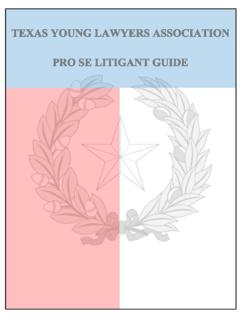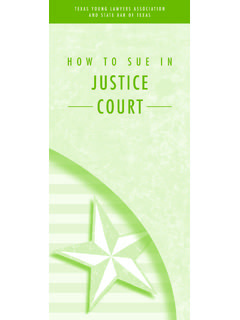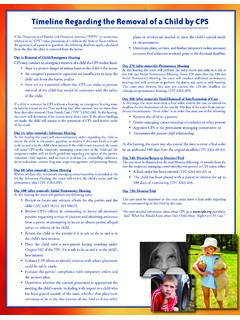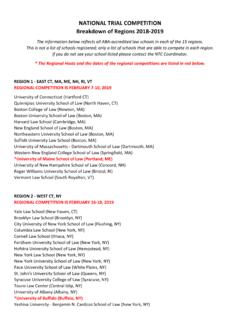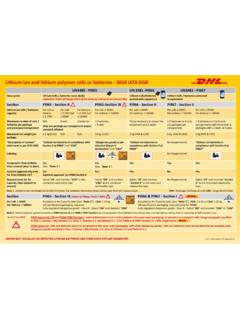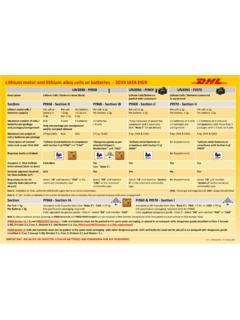Transcription of Employers Guide to General Employment Law - TYLA
1 Employers Guide to General Employment Law Employment Law Basics for New Employers The Texas Young Lawyers Association Chairs Geoff Gannaway Adrienne Clements Ken Riney Jeff Armstrong Vice Chairs Erin O'Driscoll Leif Olson Shivali Sharma Kendall Hayden Brooke Ulrickson Kelly Burris Sarah Rogers Executive Committee Jennifer Evans Morris, President David Anderson, Chair David C. Courreges, Vice President Kristy Sims Piazza, Secretary Alyssa J. Long, Treasurer Natalie Cobb Koehler, President-Elect Alfonso Cabanas, Chair-Elect Cori A. Harbour, Immediate Past President Copyright 2008, updated 2011. TEXAS YOUNG LAWYERS ASSOCIATION. Created by the Texas Young Lawyers Association. All rights reserved. No part of these materials may be reproduced in any form or for any other purpose without the written consent of the Texas Young Lawyers Association.
2 Table of Contents 1. Introduction .. 1. 2. Hiring your first employees .. 1. Impermissible bases for making hiring decisions.. 1. Title VII .. 1. Americans wth Disabilities Act .. 2. Age Discrimination in Employment .. 3. Genetic Information .. 3. Texas Commission on Human Rights Act.. 3. Permissible application and interview questions.. 3. Negligent hiring and negligent retention.. 3. I-9 (work eligibility requirements) .. 4. New employee reporting requirements .. 4. 3. Hours and Pay .. 5. Fair Labor Standards Act.. 5. Minimum Wage.. 5. Minimum Wage Exemptions .. 5. Opportunity Wage.. 5. Tipped Employees.. 5. Special Employment Certificates .. 6. Overtime .. 6. Fair Labor Standards Act Compliance Requirements .. 7. Required Records .. 7. Record Retention .. 8. Where Records Are To Be Maintained .. 8. Child Labor Provisions.
3 9. Texas Payday Law.. 10. Frequency And Methods Of Pay .. 10. Limitations On Wages Paid In Kind .. 10. Final/Severance Pay .. 10. Deductions From An Employee's Pay .. 10. Deductions Allowed Without An Employee's Authorization .. 11. Deductions Requiring An Employee's Authorization .. 11. The Wage Claims Process Before The Texas Workforce Commission .. 11. The Texas Workforce Commission Rules Against Employee .. 12. The Texas Workforce Commission Rules Against Employer .. 12. Potential Criminal Penalties Against An Employer .. 12. 4. Treatment of Employees .. 13. Discrimination & Harassment .. 13. Title VII & The Texas Commission on Human Rights Act .. 13. Race Discrimination & Harassment .. 14. National Origin Discrimination .. 14. Sexual Discrimination & Sexual Harassment .. 14. Religious Discrimination.
4 15. Disability Discrimination .. 15. Age Discrimination .. 16. Family Medical Leave Act .. 16. Retaliation.. 18. Genetic Information Nondiscrimination Act Preventing Discrimination and Harassment.. 18. The Equal Employment Opportunity Commission &. The Texas Workforce Commission .. 19. Workers' Compensation Insurance .. 20. Employer's Benefits & Responsibilities .. 20. Employee's Benefits & Responsibilities.. 20. Employee's Privacy Rights .. 21. Employer's Duties To Employees .. 22. 5. Resignations and Terminations.. 23. Employment At Will .. 23. Jury Service, Military Leave, and Voting .. 23. Jury Service.. 23. Military Leave .. 24. Voting .. 24. Consolidated Omnibus Budget Reconciliation Act of 1985 or COBRA .. 24. Handling Inquiries From Potential Employers .. 25. Unemployment Insurance.. 25. 6. Protecting Your Business.
5 26. Liability For An Employee's Acts.. 26. Common Situations For Employer's Liability .. 26. Different Forms of Business Insurance.. 27. 7. Required Postings .. 28. 8. Other Helpful Resources .. 29. Especially For Texas Employers . From Texas Workforce Commission.. 29. United States Department Of Labor Employment Law Guide .. 29. Equal Employment Opportunity Commission .. 29. United States Small Business Association .. 29. Other Useful Websites .. 30. 1. Introduction Every employer should be familiar with Employment law. If an employer does not comply with state and federal Employment requirements, it risks civil or criminal liability. But the myriad state and federal statutes relating to the hiring, termination, and compensation of employees can be difficult for a new or first-time employer to identify and understand.
6 This handbook is meant to provide a brief overview of the overlapping state and federal requirements so that new or first-time Texas Employers can avoid Employment disputes with their employees. This handbook is intended to provide General guidance only and is current as of April 2011. Laws frequently change and this Guide is not a substitute for the advice of a lawyer. The Texas Young Lawyers Association hopes, however, that by providing Texas small businesses with a better understanding of their legal rights and remedies, this handbook will help prevent many legal problems from ever arising. 2. Hiring your first employees Impermissible bases for making hiring decisions Title VII. The main federal statute prohibiting job discrimination is Title VII of the Civil Rights Act of 1964. The Equal Employment Opportunity Commission, or EEOC, is the federal agency that enforces Title VII.
7 Title VII prohibits Employers from discrimination by setting or changing a person's compensation, terms, conditions, or privileges of Employment , based upon that person's race, color, religion, sex, or nationalorigin. Therefore, under Title VII, Employers cannot use any of these factors in determining whether to hire (or, for that matter, discipline or terminate) a certain applicant/employee. The EEOC takes the position that, while there is no Federal law that clearly prohibits an employer from asking about arrest and conviction records, using arrest records as a screening device to automatically exclude an applicant because of an arrest is generally a violation of Title VII because this excludes a disproportionate number of minorities from the hiring process. Thus, absent a business justification, an employer may unlawfully discriminate against minority group persons as a class when it uses arrest record information as an absolute measure to prevent a person from being hired.
8 Asking about arrests may be lawful if the employer. Asks for a legitimate business purpose;. Uses an applicant's arrest record only as a basis for additional inquiry; and 1. Bases any adverse Employment decision not just on the arrest record, but on other legitimate, nondiscriminatory reasons discovered after that additional inquiry. A record of conviction record is different than an arrest record a person who has been arrested is presumed innocent, but a person with a conviction is not. An employer generally can use an applicant's conviction record if there is a link between the job requirements and a criminal history. Indeed, for certain jobs, an employer who doesn't ask about applicants' arrests or convictions may be liable to other people for negligent hiring or other Employment -related claims, so it is critical for an employer to decide whether to ask about arrests or convictions on a job-by-job basis.
9 As with arrest records, an employer should not automatically exclude an applicant because of a conviction without a legitimate business reason: A conviction can be used as a basis for further inquiry, but not as a screening device. A ban on hiring convicted criminals that has a disproportionate effect on minorities must be justified by business necessity. In addition, the Fair Credit Reporting Act ( FCRA ) prohibits Employers from requesting credit reports without an applicant's or employee's prior authorization. An employer that relies on credit references in making hiring decisions may run afoul of Title VII if a person's credit-worthiness is not related to the job or necessary to the business. Americans with Disabilities Act The Americans with Disabilities Act ( ADA ) makes it unlawful for an employer to: 1.
10 Limit, segregate, or classify an applicant or employee in a way that adversely affects that person's opportunities or status because of the person's disability;. 2 fail to make reasonable accommodations for an otherwise-qualified person's known physical or mental impairments;. 3. deny Employment opportunities because of a person's need for reasonable accommodation; or 4. use qualification standards, Employment tests, or other selection criteria that tend to screen out individuals with disabilities, or fail to use Employment tests in a manner that ensures accurate measurements of what the tests purport to measure. Under the recent Americans with Disabilities Amendments Act ( ADAAA ), there are three ways to bring a disability claim, under an actual disability, record of . disability, or perceived disablity.

